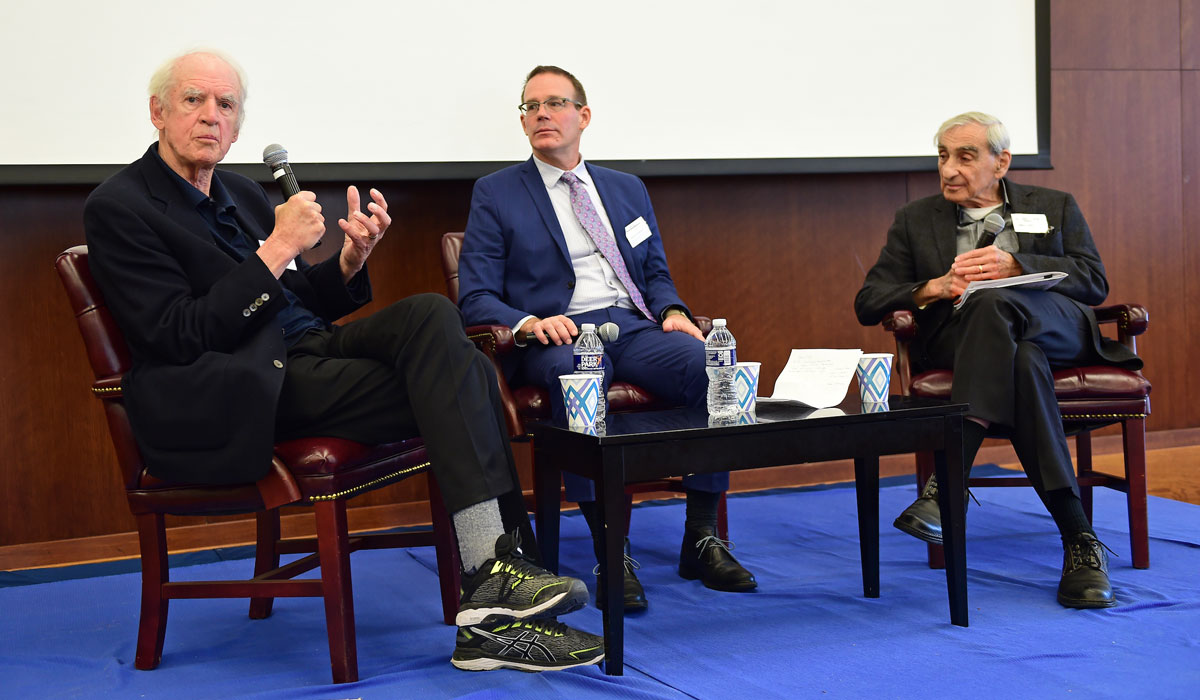

Politics and morality don’t always go together, but they made a good match when philosopher Charles Taylor and political theorist Michael Walzer met in conversation about the meaning of democracy on Friday, Nov. 15, in Caldwell Auditorium.
In his introductory remarks, event moderator William Barbieri, professor of ethics in the School of Theology and Religious Studies, said Taylor had just been in the Vatican, where he met with Pope Francis and was awarded the Ratzinger Prize. Walzer, he added, was recently in England, marching with anti-Brexit protesters.
Recognizing the timely appearance of the “two sages of democracy,” as he called them, Barbieri said, “Democracy has come upon trying times around the world and here in the U.S.”
The sages agreed with his assessment of democracy’s troubles, and offered at least a partial remedy. Each spoke separately, and then in dialogue.
“Democracy, when it’s working well, provides a safe space for argument,” said Walzer, an emeritus professor of politics at the Institute for Advanced Study in Princeton, N.J., with a history of political activism dating back to the struggle for African American civil rights and the anti-Vietnam War movement.
Walzer described the keen pleasure he still takes in voting, even as an octogenarian, adding that many people throughout history have not had the chance to influence political decisions about their lives.
“The important work of social criticism begins with complaining,” he said, praising the Jewish tradition of kibitzing, or gathering on the sidelines to discuss and argue about things. “Authoritarian rulers feel threatened by these sorts of arguments and try to repress them, which helps to convince me that they are meaningful.”
Despite his own high level of political involvement, Walzer noted that a functioning democracy also provides a safe space for people to opt out of politics and focus on other facets of life. Nonetheless, he said, it is cause for worry when too many citizens disengage.
“Democracy is in trouble if people don’t believe they can have an impact when it matters,” Walzer said, adding that it may be in argument that the meaning of democracy lies.
Taylor, an emeritus professor of philosophy at McGill University in Montreal, offered general agreement with Walzer’s remarks, while illuminating some of the ways democracy has gone wrong.
Democratic societies require participating with other people, he noted, with whom we do not always agree. The idea of the common good is important, but we no longer seem able to agree on what is good.
“Democracy depends on certain common meanings,” Taylor said. “It requires people to be motivated to take part.”
How can we define our common identity, he asked, when it’s so easy to think that people different from us don’t belong? A high degree of polarization is reflected in arguments such as the ones often heard in recent years about “givers” and “takers.”
For democracy to work, Taylor continued, measures must be taken to include people who aren’t fully capable of exerting their own power.
“Any properly organized society involves some degree of redistribution,” Taylor said. Without that, he added, “The society is not viable.”
Democracy, Taylor suggested, is like a muscle that must be exercised to remain strong. When people feel as if they can’t make an impact on the way things are, he said, even the idea of potential paths to strengthen democracy disappear.
Joining in dialogue after their opening remarks, Taylor and Walzer agreed that the sense of common membership in our society must be strengthened.
“It’s important to work with people from many backgrounds,” Taylor said.
“Right now,” Walzer said, “we need citizens to come forward and defend the views of our common life, because our values are under attack.”
“We have William James’ ‘moral equivalent of war’ staring us in the face with global warming,” Taylor said. “California is burning, and the president says it’s a hoax. It’s pretty terrible that people can be so utterly blind to what’s staring them in the face.”
The international Council for Research in Values and Philosophy and the McLean Center for the Study of Culture and Values were sponsors of the event, which attracted nearly 200 people. Charles Taylor has collaborated closely with the McLean Center over the past decade. The center is named for the late Rev. George F. McLean, O.M.I., a professor at Catholic University who promoted the work of philosophers from many cultural traditions.